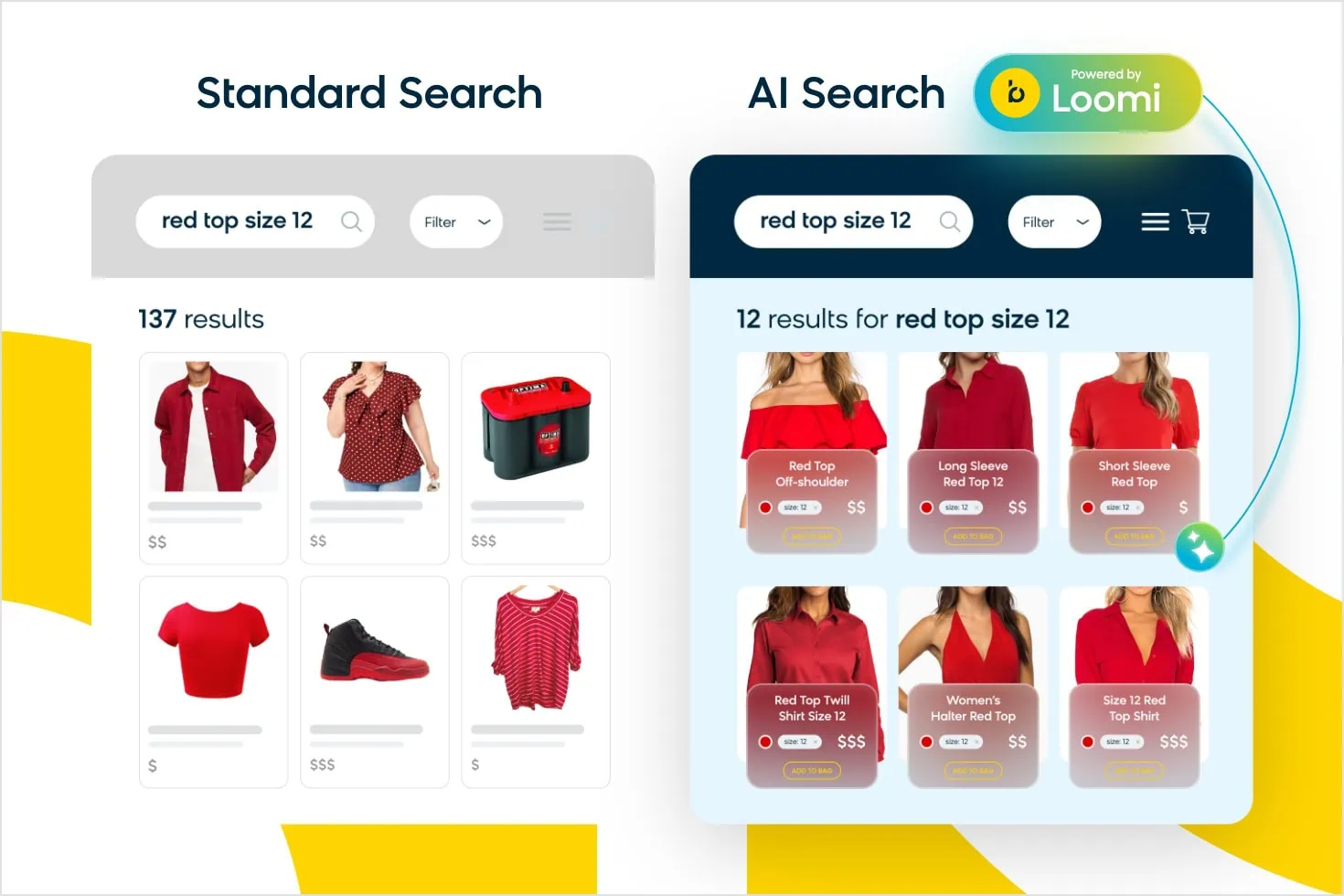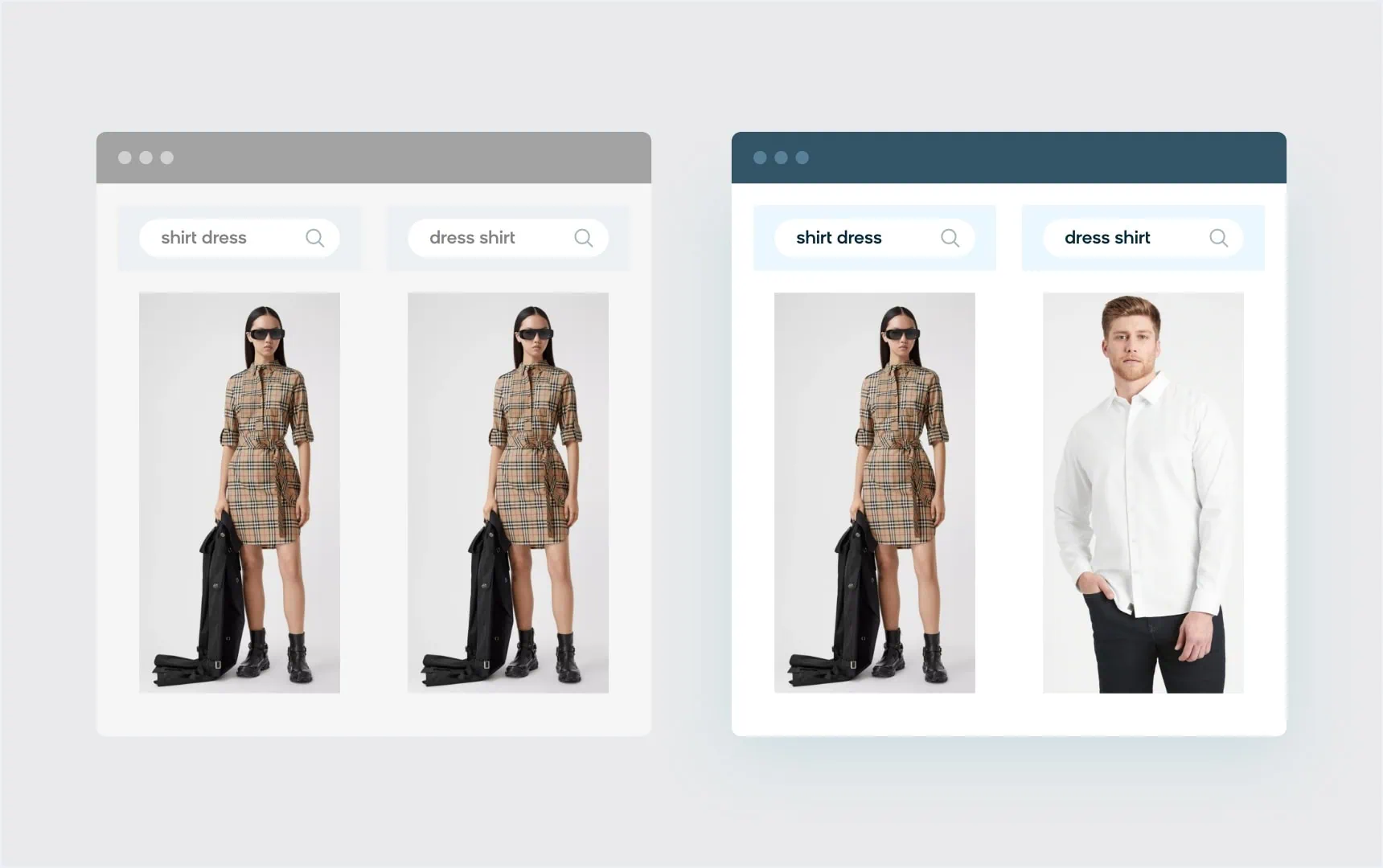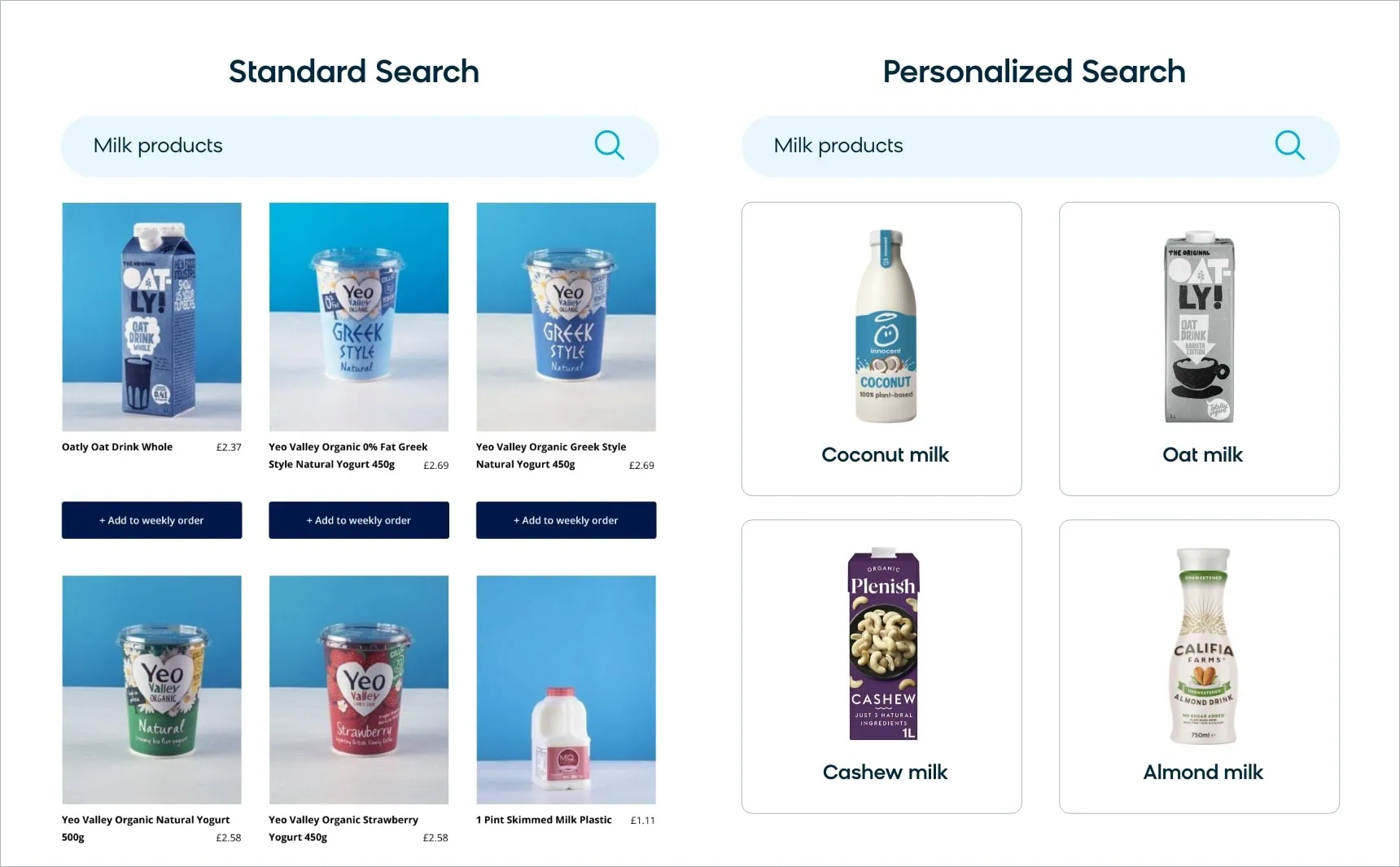Ecommerce is one of the leading adopters of AI because of its potential to enhance the customer experience — 84% of ecommerce businesses either use or have AI as a top priority. One of the most frustrating parts of the customer journey occurs during site search when a customer enters their query and is presented with: “No results found.”
Often, there will be a relevant product, but unless the customer has used the exact phrase stored in the database, it yields no results. However, AI gives site search intelligence to know when words are related. It’s why AI-powered site search is known to generate a 15-20% greater average order value due to better merchandising and product recommendations.
In this article, we explore how AI is giving retailers a competitive edge through site search, and where they can use it to best effect.
What Is AI Ecommerce Site Search?
When it comes to search, close enough isn’t good enough. For example, a search query for “red top size 12” could yield 100+ results with different styles, fits, color shades, and fabrics. From a user perspective, it becomes hugely frustrating when they’re forced to filter results or perform multiple searches to find what they’re looking for.
However, because AI analyzes historical behavior data, like a user’s past searches and purchases, as well as wider market data, like social media trends and the current season, it delivers more accurate and relevant results. Like an in-store shopping assistant, AI helps pinpoint what customers want online because it understands:
- Natural language queries: for example, “black skirt for the office”
- Numeric understanding: for example, to know 30inch, 30”, and 30-inch are the same measurement
- Synonyms: for example, understanding “jumper,” “sweater,” and “cardigan” are related
- Typos: for example, knowing that “red tpo size 12” contains a misspelling and still returning relevant results
With AI site search, customers can input any keywords and receive relevant search results. Furthermore, retailers can automatically optimize search results pages to help customers find what they want faster, as well as intelligently rank results to boost, bury, pin, and hide products, which reduces the hours spent on merchandising tasks by 30-50%.
AI Site Search vs. Traditional Site Search
The quality of results given by traditional site search is dependent on the user phrasing their query to match the keywords in the underlying product database. This places a burden on the customer to think about how the database has been created. It also limits the customer experience because if the search can’t account for the individual user in its results, it’s likely to return irrelevant results for complex queries or those using colloquial terms (or generic results because it doesn’t understand the context).
AI-powered site search is different because it understands user intent, which supports accurate product discovery.
Using AI, the search bar can anticipate the customer query and offer auto-suggestions from a drop-down. When selecting the products to display on the results page, the technology understands the context of the query and knows the individual customer based on past behaviors, so will filter results accordingly. It can help surface old stock in the warehouse by accounting for synonyms. It can provide opportunities to upsell/cross-sell through widgets like “Customers who bought X also bought Y.” And because AI uses machine learning, the results will only become more accurate over time.
How AI Site Search Helps Grow Ecommerce Revenue
AI makes the search experience more human to mimic the in-store experience, and nearly three-quarters (73%) of consumers say they’re prepared to pay a price premium of between 7-16% as a result.
AI site search supports marketers by helping them predict customer behaviors and needs, uncover frequent customer journeys so they can be optimized and personalized, and deliver a seamless omnichannel experience.
In the following four sections, we explore some of the best use cases for AI within ecommerce site search:
Personalization
The #1 area where AI helps ecommerce businesses boost their revenue is personalization — half of consumers have chosen, recommended, or paid more for a brand that provides a personalized experience.
Personalized search works by learning from past behaviors to adjust future results. For first-time visitors, it uses lookalike customers to make relevant recommendations based on similar interests and needs. It goes beyond simple keyword matching to understand context and intent, distilling the insights from petabytes of data to provide (hyper) personalized experiences in real time that guide the next interaction between a customer and a brand.
Before AI, customers struggled to navigate Jenson USA’s online catalog of 30,000+ products. Advanced site search allowed the retailer to refine results pages dynamically and automatically, which boosted online conversions and increased the revenue per visitor by 8.5%.
Delivers Better Product Results
Personalized shopping cart recommendations are known to influence 92% of shoppers to buy more products. Through AI site search, retailers can optimize average order values to maximize their revenue via relevant and timely product recommendations. It can also boost customer lifetime value, as 56% of online customers are more inclined to return to a site that offers personalized product recommendations.
AI makes site search customer-centric, enabling the website to get to know a customer first before offering suggestions. For example, The Vitamin Shoppe used AI site search to optimize category pages to convert more browsers into paying customers. By improving product discovery, it increased the add-to-cart rate by 11%.
Four of the most effective ways to deliver AI-powered product recommendations to online customers are:
- Bestsellers: Use social proof to secure the click
- Recommended for you: Use past searches/purchases to recommend similar products
- Customers who bought X also bought Y: Use data from customers with similar profiles
- Collections: Inspire undecided shoppers or use it as an opportunity to upsell and cross-sell
Learns From Past Searches and Purchases
AI is capable of learning in the same way a human does. It analyzes historical data to create a user profile and tailor their shopping experience accordingly.
This also allows a retailer to forecast future demand by identifying patterns in the data, such as knowing a customer buys pet food bi-weekly and buys more sunscreen in January, or seeing a historical 20% increase in tablet sales on Black Friday. It’s particularly useful to level the playing field for small independent shops that compete against large ecommerce platforms because it requires little manual effort — AI does all the hard work.
For example, Level Nine Sports had growing issues with inventory for niche items, which sat in the warehouse for too long. Once it employed AI, the search learned how these items related to common queries, so they displayed when customers were looking for a similar product. As a result, the company experienced a 23.39% increase in conversions, which cleared out old inventory faster to put working capital back into the business.
Over time, AI becomes smarter and produces more relevant results due to predictive search. It not only enables retailers to show the right products to the right customer at the right time but also to suggest these products in a particular order based on their previous engagement.
Omnichannel Integration
Three-quarters of customers use multiple channels when shopping. Omnichannel personalization is known to increase revenue by 10-15% because it meets customers’ expectations for a consistent experience across all channels and in real time.
Through AI retailers can create sophisticated omnichannel journeys across email, SMS, web, and in-store from a single tool, with every touchpoint optimized using A/B testing.
A Case Study for Ecommerce Site Search Revenue Growth
Like many successful retailers, Canadian Tire questioned how to continually provide the best online experience to its customers. However, a vast product catalog impacted its ability to deliver relevant and personalized recommendations — until it employed AI site search.
Immediately, Canadian Tire gained access to sophisticated AI technologies, like natural language processing, advanced attribute extraction, and insights from past visitor behavior to offer accurate results. Furthermore, by continuously tracking users, results can be automatically adjusted to push forward products that users have responded to best in the past. It led to a 20% uplift in conversions because customers felt understood with every visit.
Boost Your AI Site Search With Bloomreach
Ecommerce is one of the most competitive sectors, which is why it’s crucial for retailers to deliver seamless experiences across every channel, in real time, and at scale.
That’s where Bloomreach Discovery can help. Our product discovery solution is powered by Loomi, an AI built specifically for ecommerce. Loomi taps into 14+ years of ecommerce data to create personalized site search that drives impact faster than any other product discovery solution out there.
Ready to get started? Find out how you can use Bloomreach Discovery to automatically personalize your search experience.



















